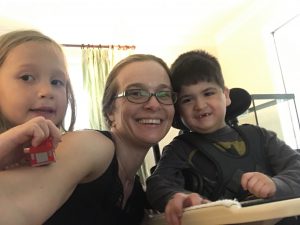 I was finally able to introduce Joey to my own five year old daughter. She had been begging to meet him for awhile. Joey lit up when he saw that I’d brought him a friend, and quickly found the words “Hi. My name is Joey. I live in Virginia” on his eye gaze device. When she buried her head into my back, not immediately replying in perfect response to his introduction, I whispered that she was shy. His eyes responded with understanding. It didn’t take him long before he repeated, “Shy. Shy” for emphasis.
I was finally able to introduce Joey to my own five year old daughter. She had been begging to meet him for awhile. Joey lit up when he saw that I’d brought him a friend, and quickly found the words “Hi. My name is Joey. I live in Virginia” on his eye gaze device. When she buried her head into my back, not immediately replying in perfect response to his introduction, I whispered that she was shy. His eyes responded with understanding. It didn’t take him long before he repeated, “Shy. Shy” for emphasis.
Before long, my daughter realized that Joey was a silly five year old, just like her. Maybe it was when he burped, and he quickly announced that he’d done it. “Burp.” in the middle of a story. Or when they competed to see who could answer some of the questions correctly. Both of them clearly wanted to get the answers correct, or wanted the chance to choose the next book.
My daughter has many strengths, but being a patient and understanding five year old is not one of them. Although I had so much fun during the visit playing with two of my favorite people, I was also able to see Joey through my daughter’s eyes. She asked the honest questions – without malice – that older or more understanding kids know not to ask. “Why does he keep dropping the toys I give him?” “Why do his arms move like that?” “Why does he keep saying numbers next to the right answer, but doesn’t say the right answer?”
They are honest questions, and answering them doesn’t detract from the great kid that Joey is. In fact, I hope that by answering them she can realize he isn’t dropping things on purpose, to be mean, or because he doesn’t like her. I want her – and all the kids in Joey’s kindergarten class – to understand that although his body does not work like theirs, he still has a lot to offer as a friend and classmate.
After her long string of questions on the way home – and after watching her play “I can only talk with a computer” with her sister – I decided to start working on a book for Joey’s classmates about who he is and what his limitations and strengths are. We are hoping it will give his teachers some words to use to encourage and support positive, understanding interactions between Joey and his classmates.
Another thing I noticed as I watched my daughter play with Joey, was how the games needed to be adapted slightly. My daughter isn’t fabulous at giving anyone wait time (she actually gave Joey more wait time than she’ll give me), so it was a good reminder of what we are asking other five year olds to do when they interact with Joey. I added this to the book as well – ways kids can interact with Joey so that they can still have fun.
Joey may not be able to chase his friends around on the playground, but he can roll balls down a ramp or wave a giant bubble wand, making bubbles for his friends to pop. Seeing my daughter with Joey gave me the chance to see how we can put together a recess bag so that Joey can have fun at recess and participate with his peers. My daughter can be my guinea pig the rest of the summer as we test out good five year old games.
We want to set Joey up for success, while knowing we won’t be there to help him in the day to day. Getting him used to group settings, seeing how he interacts with peers, and how they interact with him, is going to help us start preparing him for the kindergarten experience.


